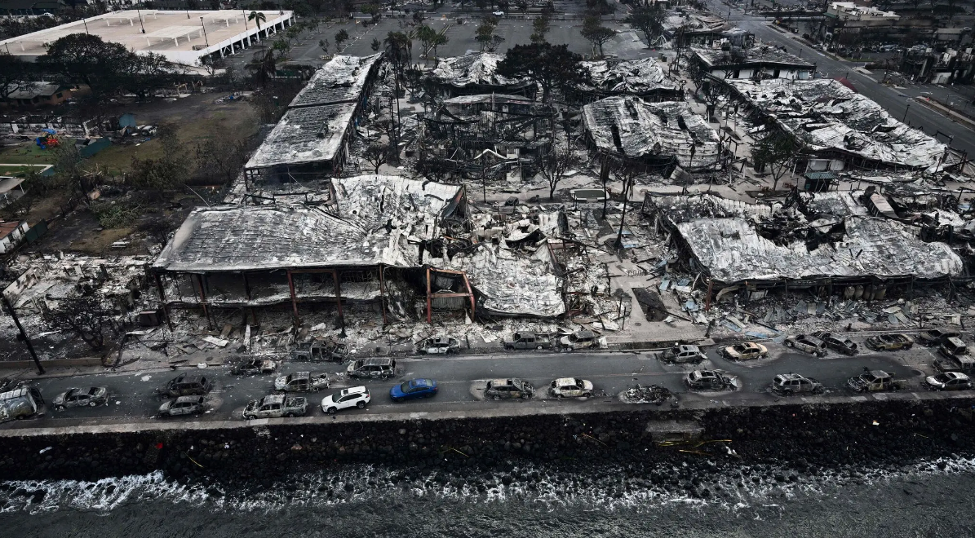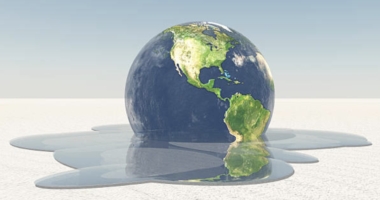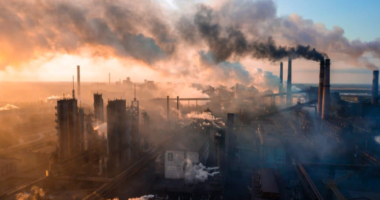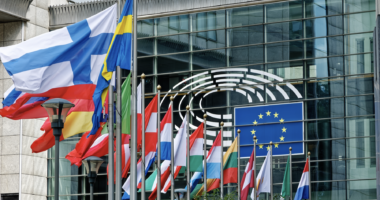Climate, Health and Equity Brief
Devastating losses, insurance in crisis and the GOP indoctrination of kids
August 14, 2023
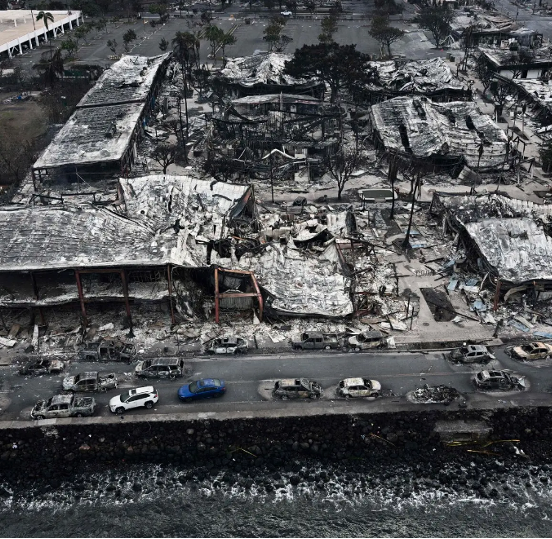
The Climate, Health & Equity Brief is GMMB’s take on the last two weeks’ news on the current impacts of climate change. If you haven’t subscribed yet, you can do so by clicking here.
Hot Topic: Dystopia. From the beaches of Maui to the mountain towns of Alaska to the bustling metropolis of Beijing, increasingly extreme weather continues to ravage cities around the globe.
July registered as the hottest month ever recorded on the planet, and intense hurricanes, out-of-control wildfires, devastating floods and omnipresent sea-level rise are increasingly becoming the new normal. The horrific, near-complete wildfire destruction of historic Lahaina—a popular island tourist destination in the middle of the Pacific Ocean—exemplifies the shocking and life-threatening challenges now being faced by communities around the globe, many of which don’t even make news in the United States.
With disasters striking more frequently and with greater intensity, emergency relief funds and insurance companies are at their limit. FEMA’s disaster relief fund is on pace to run out of money this month—before this year’s peak hurricane and wildfire seasons. A new report revealed that 90% of natural disaster-driven losses in Europe during the first half of 2023 had zero insurance protection. And in the U.S., just 60% of the $165 billion in 2020 climate-related economic losses were covered by insurance. Coupled with the fact that several insurance companies have stopped offering or renewing homeowner insurance policies in states like California and Florida, the climate crisis is translating into economic hardship—even the threat of financial ruin—for millions.
Ironically, the impacts of climate change are making it even harder to fight its causes. U.S. solar and wind energy projects face higher property insurance premiums of up to 50%, threatening to hinder the transition to cleaner energy sources. And insurance companies have a conflict of interest. A new report found that the U.S. insurance sector held $536 billion in fossil-fuel-related assets in 2019, despite insurers often citing climate-related risk as a factor in raising premiums and dropping coverage within high-risk regions.
Even with Americans in all 50 states at risk of climate-related disasters and related financial risk, Republicans have doubled down on their climate denial and set their sights on spreading misinformation to kids. Former Gov. Mike Huckabee (R-AR) has released a new children’s book, “The Kids Guide to the Truth About Climate Change,” that minimizes the role of human emissions on the climate. And Florida—undoubtedly one of the U.S. states most at risk of deadly climate impacts—has approved videos for use in K-5 classrooms that compare climate activists to Nazis, claim that wind and solar power pollute the planet, and dismiss record heat waves as natural weather variations.
Human Health
Catastrophic wildfires fueled by strong hurricane winds destroyed popular and historic Lahaina town in Maui, killing at least 96 people, destroying hundreds of homes and businesses, leaving more than 1,000 people missing, and knocking out power, internet and radio communications as other fires continue to rage across the island. (The Washington Post, CNN)
Intensifying heat is fueling a surge in cases of Chronic Kidney Disease of Non-traditional origin (CKDnt), a fatal kidney condition that is closely tied to heat stress, primarily affects outdoor laborers, and is being called “the world’s first occupational disease caused by climate change,” underscoring the need for climate-responsive workplace safety standards. (TIME)
And yet…a new Texas law intended to limit the power of local governments has revoked guaranteed water breaks for construction workers in Austin and Dallas, threatening the health and safety of construction workers who accounted for more than a quarter of heat-related deaths from 2019 to 2021. (POLITICO)
A new analysis of heat-related 911 calls in Phoenix, AZ, in July 2023—which were more than double those in July 2022—illustrates the growing concerns about human endurance during extreme heat and the potential for exponentially more fatalities as aging U.S. power grids confront increasingly extreme weather. (Bloomberg)
Deadly flooding from heavy tropical rains continues to ravage communities across China, destroying vast swaths of cropland, requiring thousands of evacuations, collapsing 59,000 homes and taking the lives of at least 33 people. (The Independent)
Planetary Health
Runoff from the Mendenhall Glacier smashed previous water-level records by nearly three feet, sweeping away two homes in Juneau, Alaska and severely damaging several others. (The Washington Post)
Warming waters are preventing salmon and other fish from returning to the open ocean, limiting the ability of Alaska’s bears – including four-time Fat Bear Week winner Otis – to bulk up for hibernation. (The Washington Post)
Equity
A Government Accountability Office analysis found that Black households would still spend a larger share of their income to buy federal flood insurance than white, Hispanic or Asian households under the “Equity in Action” rate revisions to federal flood insurance premiums. (POLITICO)
Politics & Economy
A startingly report revealed that 90% of natural-disaster-driven losses in Europe during the first half of 2023 lacked insurance protection, raising concerns as Europe continues to warm faster than the global average and faces devastating heat, wildfires and drought. (Bloomberg)
In the face of increasing extreme weather and storm damage, solar and wind energy projects are facing higher property insurance premiums of up to 50%, threatening to hinder the transition to cleaner energy sources. (Bloomberg)
While the rapid decline in solar energy costs has led to a surge in solar adoption, China’s solar dominance presents a dilemma for countries aspiring to transition to clean energy while upholding human rights and underscores the need for these nations, including the U.S., to boost domestic solar capacity. (The New York Times)
The Inflation Reduction Act (IRA) has led to $278 billion in new clean energy investments and EV sales are set to exceed one million for the first time this year, but more action is needed to reach the 2030 emissions target set by President Biden. (The Guardian)
Extreme heat is costing the economy billions in losses due to absenteeism and reduced work productivity, quickly becoming one of the biggest economic costs of climate change and expected to result in $500 billion of annual losses by 2050. (The New York Times)
Climate misinformation from the political right is proliferating, with former Gov. Mike Huckabee (R-AR) releasing a misleading children’s book, and Florida approving videos that openly reject climate change for use in classrooms across the state. (Inside Climate News, POLITICO)
Action
The U.S. Department of Energy has announced it will provide over $1 billion in federal grants to projects aimed at removing more than 2 million metric tons of carbon emissions annually, a crucial advancement in scaling up direct air capture (DAC) technology and helping the U.S. make progress toward its goal of carbon neutrality by 2050. (Reuters)
A team of researchers from Google Research, American Airlines and Breakthrough Energy using AI and satellite data has made the breakthough discovery that pilots can reduce contrails—line-shaped pollutant clouds emitted by airplanes that account for 35% of aviation warming impact—by 54% just by avoiding certain altitudes. (The New York Times)
Amazon rainforest deforestation has fallen more than 60% compared with last July, highlighting the significant impact of political change and strong commitment of President Luiz Inácio Lula da Silva and his environment minister, Marina Silva, both of whom are strong proponents of climate action. (The Guardian)
Kicker
Feeling the impact of climate anxiety this summer? Check out this video from PBS News that includes first-hand accounts from everyday people dealing with climate anxiety and helpful tips from professionals to combat it.
The apocalypse is happening.”
– Lahaina resident May Wedelin-Lee
The GMMB Climate, Health & Equity Brief would not be possible without the contributions of the larger GMMB team—Thomas Baer, Aaron Benavides, Stefana Hendronetto, Nikki Melamed, Sharde Olabanji and Marci Welford. Feedback on the Brief is welcome and encouraged and should be sent to [email protected].

